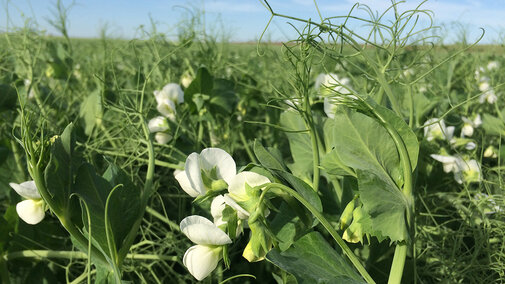Pulse Crop Expo
2019 Proceedings
If you're considering adding field peas to a rotation this year, you may be interested in these articles by Extension Educator Strahinja Stepanovic reporting on Nebraska field pea research.
Field Pea Variety Trial Results
Research findings show benefits in soil nutrient cycling, water infiltration, and microbial activity from replacing fallow with grain-type field peas in a wheat-fallow rotation in western Nebraska.
Field Pea Production: Rotational Costs and Benefits
Research findings show benefits in soil nutrient cycling, water infiltration, and microbial activity from replacing fallow with grain-type field peas in a wheat-fallow rotation in western Nebraska.
Double Cropping Pulses with Short-Season Crops, Forages, and Cover Crops in Eastern Nebraska
A research project in eastern Nebraska is evaluating a double crop production system as a potential alternative to the traditional corn/soybean rotation. Following an early season crop of yellow field peas, short-season crops (corn, soybean, grain sorghum, millet, and sunflower) and annual forages (forage sorghum and sorghum-Sudangrass) were planted.
Field Pea and Chickpea Germination and Yield as Affected by Tillage
Research conducted at Grant found that spring tillage prior to planting caused faster germination and better yield of field peas and chickpeas as compared to no-till during the above-average wet and cool 2018 growing conditions.
Field Pea Seeding Rates, Seeding Depth, and Inoculant
Grain-type field peas are a cool season grain crop grown as an alternative for no-till summer fallow in a semiarid cereal-based cropping systems such as wheat-corn-fallow and/or wheat-fallow. They are typically planted in mid-March and harvested late-July. This article reports on research conducted on seeding practices and offers recommendations for producers on the economically optimal seeding rate, seeding depth, and inoculant to grow field peas in western Nebraska.
Field Pea Guide to Herbicide Carryover And Herbicide Efficacy
How to avoid herbicide carryover injury when designing an effective herbicide program for crop rotations integrating field peas.
Field Peas—Economic Decision Support Tool
Replacing Summer Fallow with Grain-type Field Peas: New Markets, New Opportunities
University researchers from Nebraska, Colorado, and Kansas are conducting studies in the western High Plains to learn how field peas can be integrated into rotations, replacing fallow. Grain-type field pea is a spring-planted cool-season crop that is now grown on almost 100,000 acres in west central and western Nebraska.

